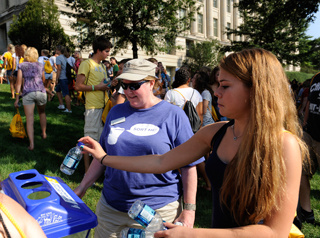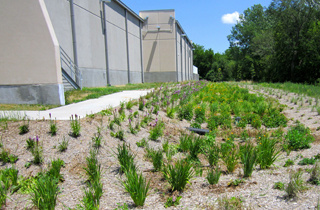University of Iowa’s faculty, staff, and students have a drive and passion for a more sustainable campus, community, and world. Throughout this past academic year, their efforts have resulted in improved practices and innovative solutions toward meeting the university’s 2020 Vision for Sustainability.
Here are some highlights from the past year:
Regents schools join sustainability rating system
Iowa’s three Board of Regents universities in September announced participation in a unique program to encourage sustainability in all aspects of higher education. The program, called the Sustainability, Tracking, Assessment, and Rating System (STARS), is administered by the Association for the Advancement of Sustainability in Higher Education (AASHE).

STARS is a transparent, self-reporting framework for colleges and universities to measure their sustainability performance.
To date, more than 200 higher education institutions have registered as STARS participants. Iowa State University and the UI recently enrolled in the program, and the University of Northern Iowa—one the nation’s first participating schools—recently re-enrolled.
“We’re looking forward to participating in STARS. Not only will this effort provide a forum for reporting our schools’ sustainability progress, we’re looking forward to sharing all the great work that’s being done on our campuses,” says Liz Christiansen, the director of the UI Office of Sustainability.
AASHE’s STARS program involves publicly reporting comprehensive information related to a college or university’s sustainability performance. Participants report achievements in three overall areas: education and research; operations; planning, administration, and engagement. All of the requirements for evaluating and scoring institutions are transparent and made publicly available.
Points are earned in each category and lead to a STARS rating of Bronze, Silver, Gold, or Platinum. Participating in STARS, which includes gathering extensive data and sharing it publicly, represents a significant commitment to sustainability.
LEED certifications
The new UI Information Technology Facility (ITF) has become the first building on campus to earn LEED Platinum certification—the ultimate standard for green design.

Completed in December 2011 after three years of construction and seven years of planning, the 43,000-square-foot, $30 million facility will house and protect computing and network equipment that is vital to the operations of the university and its hospitals and clinics.
The facility provides a secure and reliable home for the university’s IT systems. Its “hardened” outer shell is built to withstand severe weather, and backup electrical and cooling systems are designed to keep essential technology up and running if the primary utility systems supporting them were to fail. Two 7,200-square-foot data halls meet the ventilation and air conditioning requirements for servers and provide space for high-performance research computing.
“Data centers are among the most energy-intensive facilities you’ll find on a campus. To build ours to LEED Platinum standards speaks volumes about the UI’s commitment to energy conservation and sustainability,” says UI President Sally Mason. “Our goals for a sustainable university are stated in our strategic plan and 2020 Vision sustainability targets, and this major accomplishment significantly helps to bring those aspirations to reality.”
In addition:
- The new State Hygienic Laboratory building at the UI has earned LEED gold certification.
- Stuit Hall, which serves as a hub for the clinical psychology program in the College of Liberal Arts and Sciences Department of Psychology, earned LEED gold certification. The hall is the first LEED renovation on campus, completed in 2010.
The university is pursuing LEED certification for the Carver-Hawkeye Arena addition/renovation, the College of Public Health Building, the Pappajohn Biomedical Discovery Building, and the Hancher Auditorium and School of Music replacements. The UI has set a minimum standard of LEED silver certification for all new construction and major renovations. (Click here for more info on UI LEED projects).
Single-stream recycling system aids sustainability efforts
Among the UI's sustainability targets is an effort to achieve 60 percent waste diversion by 2020. In an effort to approach this goal, the university transitioned to single-stream recycling, making it easier to recycle on campus. Since single-stream recycling began in September 2011, UI recycling rates have increased.
Game day recycling
This fall, Kinnick Stadium has been a little greener thanks to a new game day recycling effort that started with the Iowa vs. Iowa State game on Sept. 8.
UI Athletics, Facilities Management, the Office of Sustainability, Waste Management, the Delta Tau Delta fraternity, and the ECO Hawk student organization partnered to reduce the amount of trash ending up in the landfill after football games.
Twenty-four gold-top recycling containers were placed at the Kinnick entrance gates, and 17 containers were set in the concourse areas, thereby adding to the Coca-Cola bottle-shaped bins already in place.
Fans can do their part by recycling plastic bottles, cans, plastic souvenir cups, paper cups, coffee cup holders and lids, popcorn buckets, cardboard, and paper. ARAMARK is also joining the effort by collecting pre-consumer waste (kitchen waste) in the concessions and press box areas for composting. During the post-game cleanup on Sundays, Delta Tau Delta brothers will assist City High and West High students to sort recyclable materials. Waste Management will haul all the materials collected at games to a City Carton recycling facility.
Their efforts resulted in approximately 50 percent of the waste being recycled or composted, up from 25 percent in 2011.
Certificate in Sustainability continues to grow
To build sustainability literacy and skill sets in our next generation of leaders, innovators, and entrepreneurs, the UI undergraduate Certificate in Sustainability was established and made available to students in fall 2009. Since that time, it has grown to become a popular certificate program on campus.
In 2009-2010, 11 students were enrolled in the program and three students graduated with the certificate. By spring 2012, 145 students were enrolled in the program; 41 students graduated with the certificate. More than two dozen majors are represented in the certificate program.
Conserving energy
The energy conservation goal outlined in the 2020 Vision is to attain net-negative energy growth through the decade (consuming less energy in 2020 than in 2010). Through a variety of energy conservation tools and teams, like the award-winning Energy Control Center and Energy Hawks process, the UI has leveled its energy use.
This past year’s significant progress in energy conservation was made through American Recovery and Reinvestment Act (ARRA) funding and internal reallocations to install the latest generation occupancy sensors in 11 buildings on campus. These sensors control lighting, room temperature, and ventilation rates based on the building’s occupancy.
New North Hall Garden
The UI Gardeners recently created a new satellite herb garden, located close to campus behind North Hall. This 30-by 60-foot garden plot is devoted to producing herbs, salad greens, and edible flowers to be sold to the UI dining halls. Along with a production of herbs, the garden is developing a permaculture design, emphasizing particular structures and design patterns to mimic our native ecosystem.
See a photo gallery of work done at the new garden at now.uiowa.edu/2012/06/planting-seed-sustainability.
Biomass Fuel Project
The UI has been using oat hulls as a source of biofuel since 2003, allowing the UI to use between 9 and 13 percent in renewable energy. But increasing the use of biomass fuel holds potential to achieve the UI’s 2020 target of 40 percent renewable energy. To further explore these efforts, the Office of Sustainability received a $25,000 grant from the Leopold Center for Sustainable Agriculture at Iowa State University.
The grant will help the UI locate and procure additional sources of biomass fuel to replace coal at the UI Main Power Plant, while also improving environmental performance of Iowa lands and resources and stimulating the local rural economy.
Ferman Milster, principal engineer—renewables in the Office of Sustainability, leads the Biomass Partnership Project, which includes partners from Iowa State University, the University of Northern Iowa, the U.S. Forest Service, the Iowa Flood Center, and private industry. They are studying how invasive plants, switchgrass, miscanthus grass, and residual wood could also be used as biomass fuel.